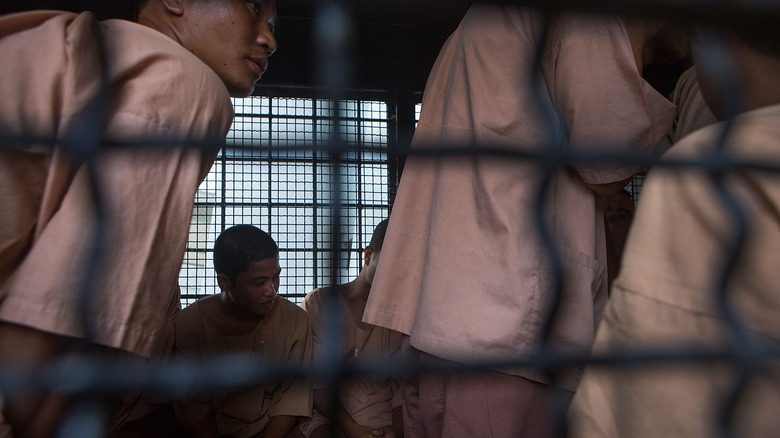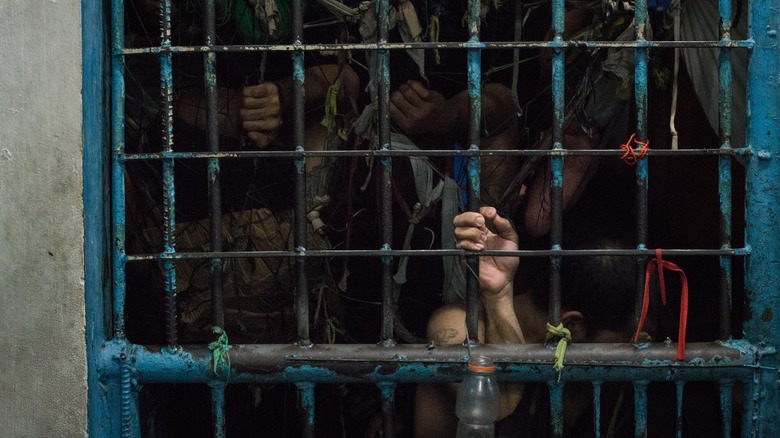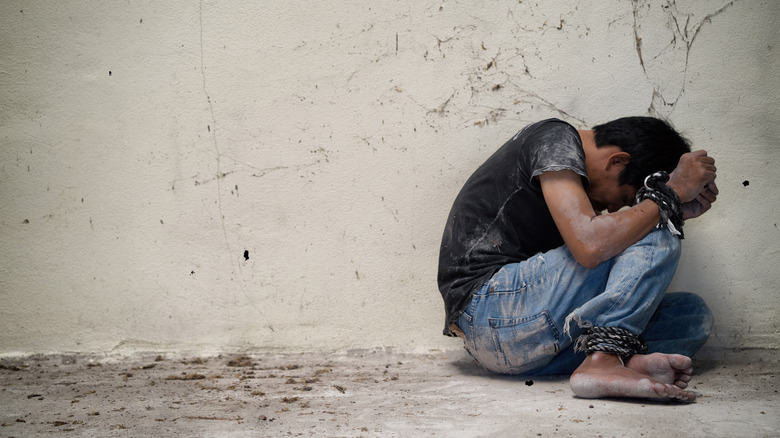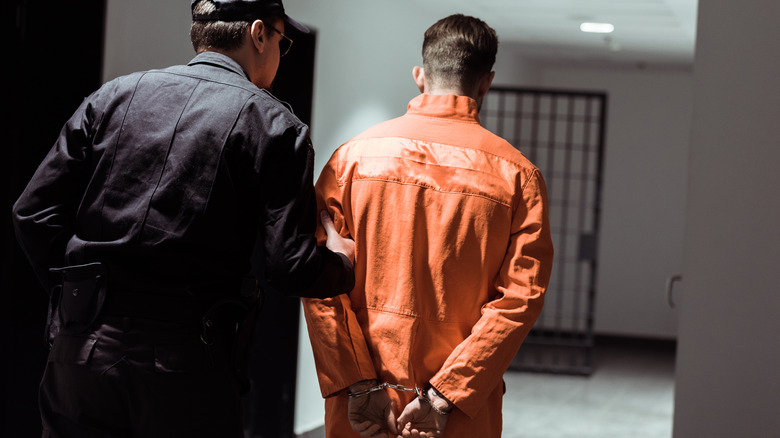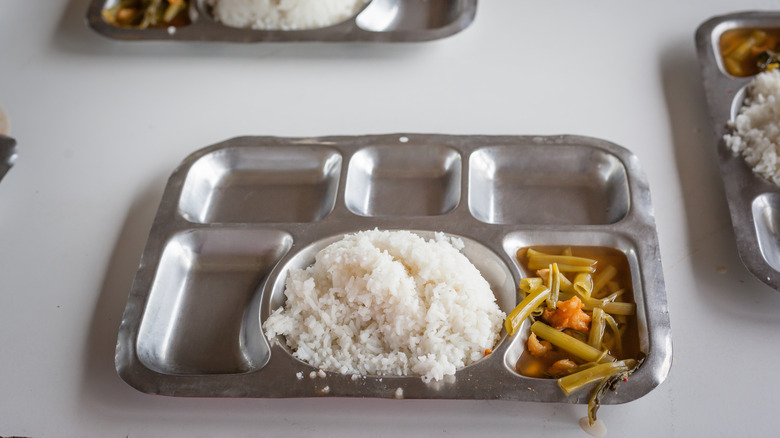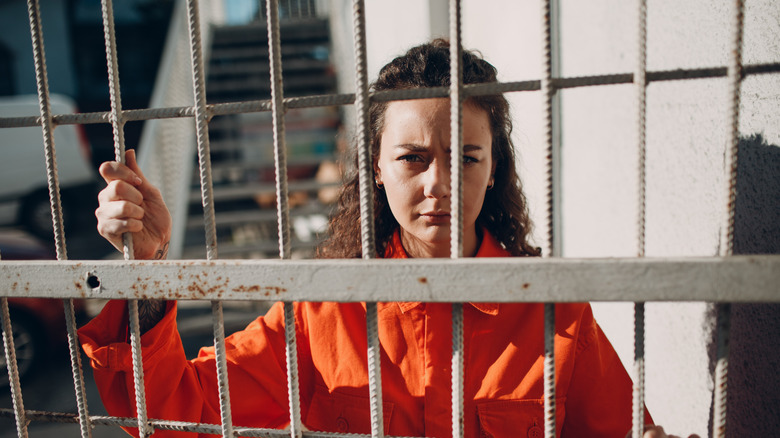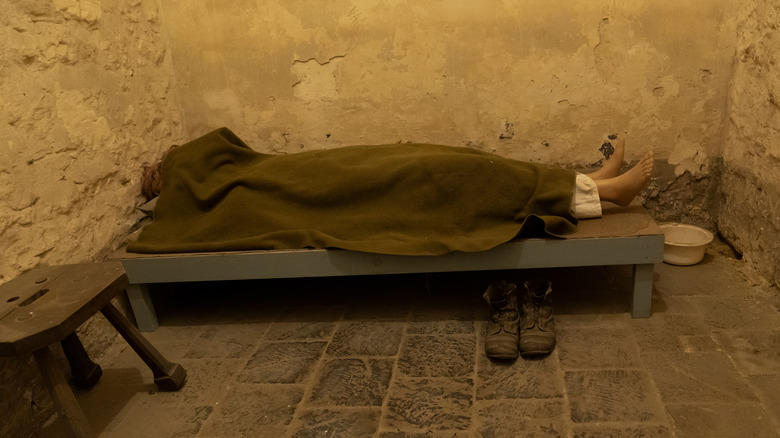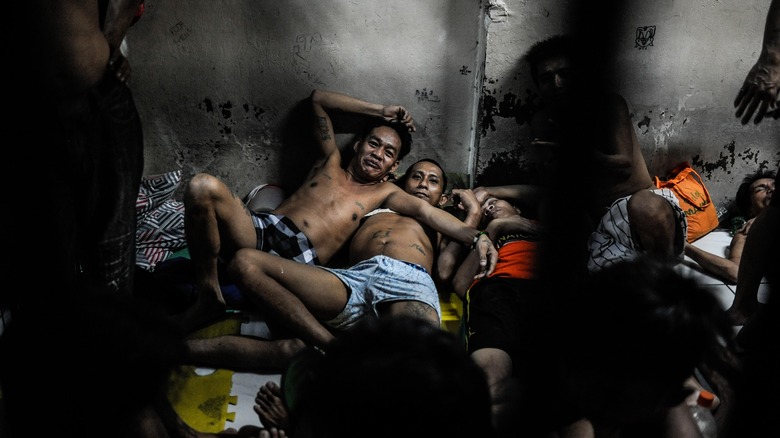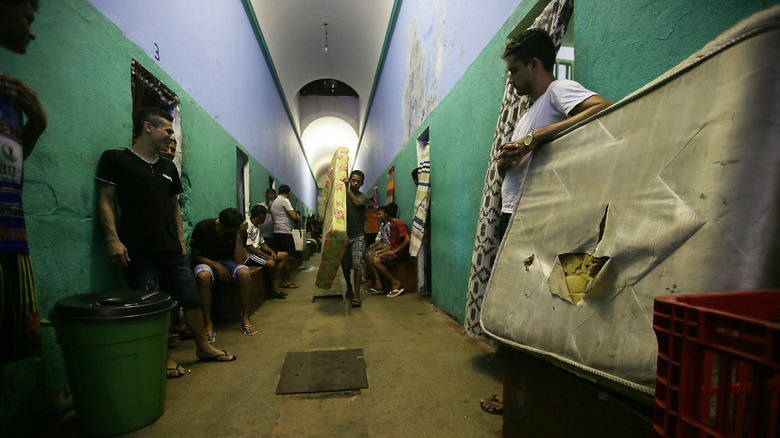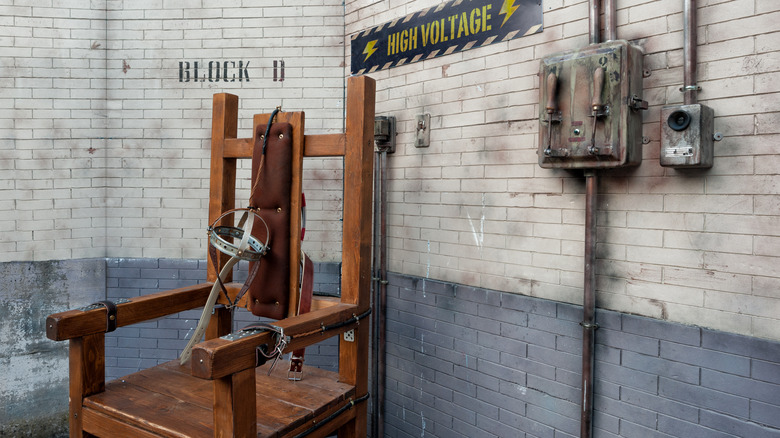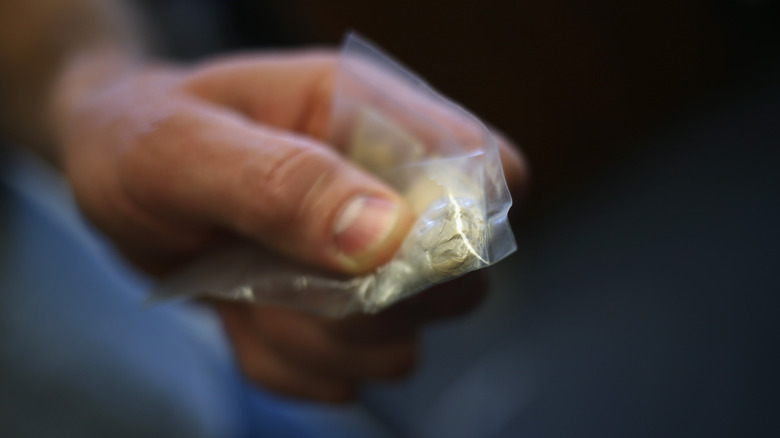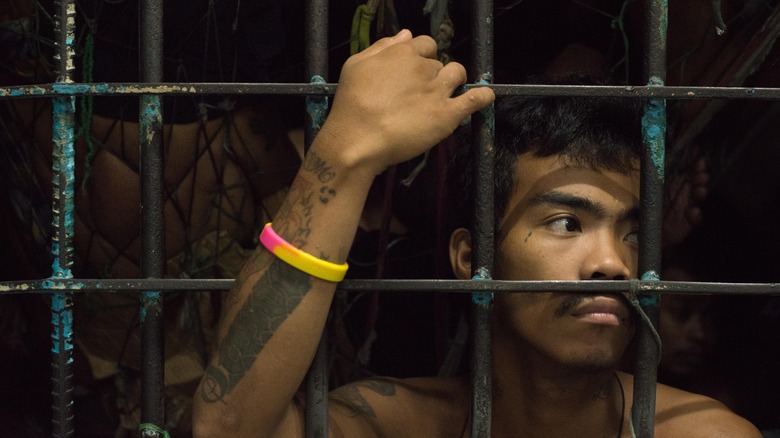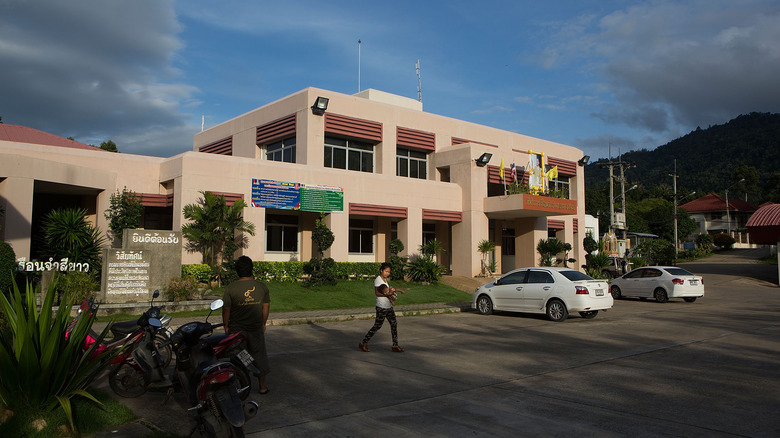What Life In A Thai Prison Is Really Like
Life in prison is rarely peachy, no matter where you are. But inmates living in Thai prisons have it one level tougher — according to this International Federation for Human Rights report, Thai jails are ridden with human rights violations. There is practically nothing that goes well for their inmates: food is scarce (and barely edible), clean water is a luxury, medical care is a joke, and the prisons run on an average of 224% occupancy. This means that inmates often have to sleep on each other's legs on the dirty floor (there are no beds in Thai prisons).
The conditions are horrible (to say the least), yet authorities do nothing to improve them. In fact, some of them seem to have accepted the harsh reality of prisoners' lives. As per "60 Minutes Australia," guards put inmates in leg irons for the first three months of their sentence to prevent them from taking their lives. This is just a minute detail from the bigger (and truly horrific) picture of life in Thai prisons.
Overcrowded is an understatement
Perhaps the prevalent and most consistent issue in Thai prisons is overcrowding. As per FIDH, the official capacity for all 148 prisons in Thailand was 118,058 in 2017. The actual population was 264,447 — 224% and far away from the recommended space of 2.25 square meters for each inmate. Harsh sentencing also means that many prisoners serve a lot of time for petty, mostly drug-related crimes (in comparison to other countries). As "60 Minutes Australia" reports, 25 years or more is the average sentence at the infamous "Bangkok Hilton" (the Bang Kwang Central Prison). This means that prisons rarely free any space for new inmates — they're almost literally thrown on top of each other.
When ex-inmate Reece Harle was thrown inside a Thai prison on a drug-related offense, he described his first night in prison as the lowest point of his life at that time (via National Geographic): "I was sleeping on a hard cold floor with a water bottle as my pillow. It was just soul-destroying." Men were sleeping on the floor like sardines in a tin can — lined up and simply unable not to touch each other. Another inmate at the Bangkok Hilton describes the same horrific ordeal, as well as the fact that prisoners have to spend 15 hours a day in these conditions (via "The Real Bangkok Hilton").
The inmates are forced into free labor
In December 2021, an exposé revealed that Thai inmates are forced and threatened into making fishing nets that the prisons sell for export (via the Thomson Reuters Foundation). The prisoners are told this work is compulsory, but they are paid way below the national minimum wage (around 3 baht for a day's work instead of 313-336 baht), with some inmates not being paid at all. It gets worse – if they don't meet the harsh quota of five nets a week, they are tortured by the prison guards: "It was 2 p.m. one day and I wasn't able to finish the nets in time, so I was forced to lie down in the sun and roll over in the dirt," one prisoner told the Thomson Reuters Foundation.
And work itself proves to be torture, too. Because the inmates have to produce fishnet after fishnet under the pressure of torture or their release dates being postponed, they develop wounds on their hands: "Our fingers would be all sore with wounds. It's real torture ... it's the worst type of work," another prisoner told Thomson Reuters Foundation. FIDH also breaks down the many kinds of forced labor imposed on Thai inmates and shares the brutal reality of a prisoner being paid 50 baht (or $1.43) a month for folding paper bags. The prisoner said: "There's another task: fixing shoes. You get 100-200 baht ($2.86-$5.71 USD) a month, but the work is harder than slavery." One can only imagine what that entails.
There is a tight schedule
Two former inmates gave a full account of the typical Thai prison schedule to Coconuts in 2017. The waking time is 6 a.m., and the first activity is taking a shower, which entails struggling to scoop out water with a bowl from a large collective basin. At 7 a.m., prisoners have breakfast, then at 8 a.m., everyone gathers in a line and sings the Thai national anthem together. Right afterward, inmates are sent to work until 3 p.m. at the earliest. All work is mandatory, but some activities (folding paper bags, making shoes, baking, and carpentry) are paid for, while some (cleaning and cooking) are unpaid.
Prisoners who have finished work can have a bit of free time until 6 p.m. From here, everyone needs to be in their cell. Inside the cell, they can watch TV until 9 p.m., when all TVs are turned off, and inmates must say a Buddhist prayer and go to sleep (or sit in complete silence).
The food is so bad, there's a black market for it
The food in Thai prisons is infamously low in nutrients and is often described as horrible. As per FIDH, many prisoners become malnourished simply because they can't feel they can eat the food that's being offered: "When eating, you have to be careful because sometimes there were stones and sand in [the food]." Per Prisoner's Abroad, ex-inmate Billy Moore describes getting a whole chicken's head and a snake for lunch (which, for lack of a better option, he had to eat).
For the luckier inmates, there are solutions to malnourishment, but they have to work their way around the Thai prison system for it. According to Coconuts, inmates can receive food from their visiting families, or if they earn money, they can purchase canned goods and instant noodles. Finally, there's another option: a sort of food black market operated by prison guards and their families. For a price, they provide better, tastier, and more nutritious menus, as per Prisoners Abroad. But these aren't always available, and sometimes, prisoners simply don't get to eat. FIDH reports that prisoners have a limited time to queue up, get food, and eat, and not everyone gets to do this three times a day. Furthermore, there are cases where inmates' families send food, but the food doesn't reach them. Corruption seems to reach every aspect of life inside Thai prisons, and this impacts inmates in terrible ways.
If you're a woman, you can be denied pads
Due to a shortage of funds and resources, Thai prisons end up cutting necessary toiletries such as women's hygiene products. As per FIDH, one Thai prison provides female inmates with four packs of sanitary pads every six months — far below the required standard. Coconuts confirms that the inmates only receive batches twice a year and adds a concerning layer to the story. Whenever a batch arrives, prison guards raid women's lockers and make sure they don't take more than two pads, as these can be used as currency in prison. This ensures a constant shortage.
Reuters tells a truly bitter story that goes to show just how tough the everyday struggle inside a Thai prison can be. A 42-year-old inmate asked the guards for pads and was denied (the guard told her off for not buying them). Later, she had an embarrassing moment that earned her public humiliation. (Chaiyaphum Prison, where she is housed, offers female inmates around 12 sanitary pads per year, 10 times below the annual quota.)
You might share a cell with a corpse
As grim as this sounds, it's true. Prisoners often take their lives or die in the cramped cells, and guards rarely check on them or take action. Ex-prisoner Billy Moore describes his very first day inside a Thai prison (via Prisoners Abroad): "The cell floor resembled a mass grave, with arms and legs all over each other. The smell of human feces was so strong I wanted to vomit. I saw a motionless body on a damp-stained mattress, insects hovering over him. 'My God,' I thought. When I dared to look again, my worst thoughts were confirmed. He was really dead." Moore also had to sleep right next to the body, as he was the new inmate, and they often draw the short straw.
Tragically, this wasn't the last time Moore saw a dead body in his proximity. According to the Bangkok Post, 30 to 40 prisoners commit suicide each year, with a thousand others succumbing to various illnesses. Unfortunately, this is not even hard to imagine, considering the cramped, unkempt conditions of prisoners' cells and the lack of access to clean water, decent food, and medical care (via FIDH).
If you or anyone you know is having suicidal thoughts, please call the National Suicide Prevention Lifeline by dialing 988 or by calling 1-800-273-TALK (8255).
Injuries and infections are the norm
Medical care doesn't really exist in Thai prisons. According to FIDH, it's down to the prison guards to decide which prisoners are worthy (or sick enough) to see a doctor. Also, there are no permanent doctors inside the prisons. General doctors visit two to three times a week, and specialists come once a week. According to inmates, doctors dismiss patients in under 2 minutes, and they treat them with disdain: "They will sit far away from us like they are disgusted by us. They will shout ... and give us paracetamol," one said.
The dirty, cramped conditions favor the formation and spread of diseases in Thai prisons. The sick are not separated from the others — as previously mentioned, sometimes, not even the dead are. Perhaps unsurprisingly, COVID-19 was a huge ordeal for Thai inmates, as BBC reports. And among viruses, inmates can contract infections from wounds, skin diseases, and tuberculosis, all of which spread easily in the overcrowded prisons. An even sadder cut to the story is that the prison guards often inflict serious injuries on the inmates, too. In this National Geographic documentary, an ex-inmate describes seeing guards smash prisoners' fingers into pieces. Elsewhere, "The Real Bangkok Hilton" confirms that prisoners must wear leg shackles for their first three months there — these lead to wounds and subsequent infections. It's perhaps an ex-prisoner that perfectly sums up the horrible reality (via FIDH): "I must not get sick because if I got sick, I'd be better off dead."
It's even tougher for foreigners
Foreigners, or "farangs," often get mocked and isolated, as few people — prisoners or guards — speak English or their native language. There is also considerable bias against foreigners inside Thai prisons. As per this National Geographic documentary, ex-inmate Reece Harle remembers walking down the prison corridors and hearing "farang" being shouted at him from numerous local inmates. There is potential bullying the inmates can experience, and of course, there is the language barrier. As Coconuts reports, the language barrier is the main issue for "farangs," as they can't rely on other prisoners' help and find it much harder to benefit from the loopholes and side systems designed by inmates to have a slightly better quality of living.
As per Thailand's Department of Corrections "Handbook for Foreign Prisoners in Thai Prisons," foreigners make up 4-5% of the Thai prison population — this is around 15,000 people. The handbook also explains the other big issue foreigners face in Thai prisons: They are far away from their families, lacking the support, food, or money required to purchase things the prisons don't provide.
You can still get a death sentence
As "60 Minutes Australia" reports, the death sentence is still in place in Thailand. Until recently, capital punishment involved an executioner and a gun. Now, lethal injection is the preferred method at the Bangkok Hilton. The sad reality is that most prisoners who receive death sentences do so because of drug offenses — yet another example of very harsh sentencing. In 2018, the Thai Examiner reported that a young Swedish man named Kim Eriksson Sirawan was sentenced to death in Thailand after the police discovered a homemade methamphetamine factory at his home in Rayong. His sentence was commuted to life in prison, but local Thai inmates aren't as lucky.
Unfortunately, Thailand's famous war on drugs means there is little forgiveness for those caught red-handed. Some drug offenders are even shot on sight before they get a chance at prison time. "60 Minutes Australia" spoke with Bang Kwang Prison's chief executioner, who shed light on how authorities view traffickers: "If they're criminals and they do something really bad, they deserve to be executed."
The war on drugs pushes police to plant evidence
Thailand has a long history of heroin, opium, and amphetamine production, as well as the smuggling of these drugs. It thus comes as no surprise that the vast majority of Thai prisoners are convicted of drug offenses. As per "60 Minutes Australia," 700 million amphetamine tablets are smuggled from Myanmar to Thailand each year. Thailand has thus declared a war on drugs, which entails making as many arrests as possible (some 72,000 in 2020).
But there is a dark truth behind these numbers: pressed by the desire to meet arrest quotas, the police end up planting evidence on innocent people. A 2009 report states that 122 people (almost half of those recruited) had drugs planted on them by police in July and August 2008, with the scenario going one of two ways. Either they were arrested (and the quotas were met), or they paid the police officers a bribe in order to be freed (59 of the 122 people did so). This only goes to show that corruption expands past the prison walls and into day-to-day life in Thailand.
If you or anyone you know is struggling with addiction issues, help is available. Visit the Substance Abuse and Mental Health Services Administration website or contact SAMHSA's National Helpline at 1-800-662-HELP (4357).
There is zero privacy
Perhaps this goes without saying, as overcrowding is a given in all Thai prisons. As per FIDH, the toilets — which are squat toilets positioned 0.6 meters away from each other — have no doors. Also, there are simply zero spaces where prisoners can have a bit of alone time or intimacy of any kind. As a result, inmates have gotten used to exhibiting sexual behavior in front of everyone else. An ex-prisoner recalls this as he spoke to Coconuts: "Many men get visibly horny just by seeing women's thighs or shoulders on a TV show. It's creepy ... I've seen them jerking off in the doorless toilet stalls. Hooking up is not uncommon either."
Another former inmate describes a similar situation in the women's section (via Coconuts): "Tomboys are super desirable. Women throw themselves at them, shower with them, and give them stuff." The absolute lack of privacy affects inmates in a myriad of ways, and all they can do is adapt to this and all the other extremely harsh conditions in Thai prisons.
You can also get chemically castrated
Unfortunately, you read right. According to CBS News, as of July 2022, Thailand is considering chemically castrating the convicts authorities believe are most likely to reoffend. The reason? As per Reuters, the Thai government is trying to curb sex crimes — 16,413 convicted sex offenders were released from Thai prisons between 2013 and 2020, and 4,848 offended again after their release. Following this distressing report, a bill was passed to introduce voluntary chemical castration for offenders in return for a reduced prison sentence. Indeed, this means that the convicts get to consent first. Still, this doesn't make chemical castration any less disturbing.
As the bill still awaits the royal vote, there are diverging views on it. Justice Minister Somsak Thepsuthin commented (per Reuters): "I want this law to pass quickly. I don't want to see news about bad things happening to women again." On the other hand, Jaded Chouwilai, director of the Women and Men Progressive Movement Foundation, doesn't believe chemical castration will help put an end to sexual assault: "Convicts should be rehabilitated by changing their mindset while in prison. To use punishment like execution or injected castration reinforces the idea that offender can no longer be rehabilitated."
If you or anyone you know has been a victim of sexual assault, help is available. Visit the Rape, Abuse & Incest National Network website or contact RAINN's National Helpline at 1-800-656-HOPE (4673).
